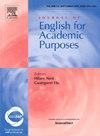Exploring first-year Chinese doctoral students’ metacognitive awareness and self-efficacy in an L2 genre-based academic writing course
IF 3.4
1区 文学
Q1 EDUCATION & EDUCATIONAL RESEARCH
引用次数: 0
Abstract
This qualitative case study (N = 11) explores first-year Chinese doctoral students' metacognitive awareness of task perception and self-efficacy in academic writing. Drawing on data from learning journals in a L2 genre-based writing course for doctoral students in sciences, this study identified a continuum of stages in their reported self-efficacy for academic writing, including low, balanced, and emerging self-efficacy. Students' descriptions of metacognitive awareness of task perception encompassed awareness of rhetorical, content, and linguistic considerations. Analyses of how students reported metacognitive awareness of task perception and their self-efficacy revealed that low self-efficacy tended to co-occur with relatively sophisticated metacognitive awareness of rhetorical considerations, while emerging, positive self-efficacy seemed to co-occur with metacognitive awareness of content or language conventions. The study reveals the first-year doctoral students' miscalibration of self-efficacy for academic writing, posing a potential challenge for English for Academic Purposes (EAP) writing instructors to address in genre-based writing instruction. It also demonstrates the crucial role of mastery experience, vicarious experience, and emotional states in enhancing students’ academic writing self-efficacy, suggesting the necessity of providing opportunities for students to achieve success in writing, observe peers, and obtain positive feedback in L2 genre-based writing classrooms.
探究一年级中国博士生在以第二语言体裁为基础的学术写作课程中的元认知意识和自我效能感
本定性案例研究(N = 11)探讨了中国一年级博士生在学术写作中任务感知和自我效能的元认知意识。本研究利用科学博士生在第二语言体裁写作课程中学习期刊的数据,确定了他们在学术写作自我效能报告中的连续阶段,包括低自我效能、平衡自我效能和新兴自我效能。学生对任务感知元认知意识的描述包括修辞意识、内容意识和语言意识。通过分析学生对任务感知的元认知意识和自我效能感的报告,发现低自我效能感倾向于与相对复杂的修辞考虑的元认知意识共存,而新兴的积极自我效能感似乎与内容或语言惯例的元认知意识共存。本研究揭示了一年级博士生对学术写作自我效能的错误校准,这给学术英语写作教师在体裁写作教学中提出了潜在的挑战。研究还表明,掌握经验、替代经验和情绪状态在提高学生学术写作自我效能感方面发挥着至关重要的作用,这表明在第二语言体体化写作课堂中,有必要为学生提供写作成功、观察同伴和获得积极反馈的机会。
本文章由计算机程序翻译,如有差异,请以英文原文为准。
求助全文
约1分钟内获得全文
求助全文
来源期刊

Journal of English for Academic Purposes
Multiple-
CiteScore
6.60
自引率
13.30%
发文量
81
审稿时长
57 days
期刊介绍:
The Journal of English for Academic Purposes provides a forum for the dissemination of information and views which enables practitioners of and researchers in EAP to keep current with developments in their field and to contribute to its continued updating. JEAP publishes articles, book reviews, conference reports, and academic exchanges in the linguistic, sociolinguistic and psycholinguistic description of English as it occurs in the contexts of academic study and scholarly exchange itself.
 求助内容:
求助内容: 应助结果提醒方式:
应助结果提醒方式:


